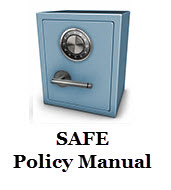|
|
State Accounting Fiscal Essentials . SAFE Policy Manual |
Revised: 11/13/2025 |
|
|
State Accounting Fiscal Essentials . SAFE Policy Manual |
Revised: 11/13/2025 |
Applicable or Related Code Sections
OAC 126-1-02 - Rates and requirements for reimbursement of travel expenses of state agents (Ohio Travel Rule).
ORC 126.31 - Travel and other expenses
Related Links
![]()
The purpose of this policy is to provide additional guidance to complement the rules and provisions outlined in OAC 126-1-02 - Rates and requirements for reimbursement of travel expenses of state agents (commonly known as the Ohio Travel Rule). This policy does not substitute, override, or replace any rule or provision within OAC 126-1-02.
The terms of this policy apply to all state agents and contractors of state agencies, departments, boards and commissions for the purpose of reimbursement of travel expenses. If the restrictions in this policy conflict with a current collective bargaining agreement or other legally binding document, then the terms of any such agreement will prevail.
Supervisors are responsible for approval of Travel Authorizations and Expenses, as applicable, in the OAKS Travel and Expense Module as outlined in the OAKS FIN Process Manual Supervisors shall only approve requests when there is a legitimate business reason for the travel and when the travel arrangements are the most economical and efficient.
All state agents traveling at state expense or on paid travel status must be authorized prior to travel by the head of a state agency or his/her designee.
When the head of a state agency or his/her designee approves of a state agent’s travel, such action constitutes certification that the reimbursement of such state agent’s travel expenses is proper.
State agents may also obtain authorization from their supervisor to travel and request reimbursement regardless if a travel authorization is required in the OAKS Travel and Expense Module.
A state agent may delegate entry authority to enter Travel Authorizations or Expense Reports in OAKS Travel and Expense Module; however, the agent remains responsible for all submissions on their behalf. A state agent may not delegate authority to their supervisor responsible for approval.
A state agent shall submit a travel expense reimbursement request within ninety days of the last date of travel. OBM will deny all travel requests outside of the ninety days unless a travel exception, as outlined in section F of this policy (below), has been requested and granted or the terms of an applicable collectively bargained agreement differ.
Supervisors shall only approve requests that conform to OAC 126-1-02 (Ohio Travel Rule), the OAKS FIN Process Manual and the guidelines within this policy.
Supervisors may delegate an alternate approver within the OAKS Travel and Expense Module. Those acting in an alternate approval status shall follow the same roles and responsibilities conferred upon the original supervisor.
Contractor Travel
Whenever possible, contractor's travel must be negotiated using a deliverable-based method so that travel rates are not an issue. However, if necessary to reimburse travel expenses for contractors, the expenses must be reimbursed pursuant to OAC 126-1-02 and submitted for reimbursement using .
Travel Exceptions
In accordance with the OAC Section 126-1-02 (G), the head of a state agency or his/her designee may submit a written request for exception to the Director of Budget and Management for an exception to the travel rule.
The exception request must be from the agency Director or his/her designee and submitted via the OBM Director Request Portal. A travel exception can be selected in the portal. The request must describe the circumstances that led to the need for the request; dates and dollar amounts, as applicable; steps taken to prevent future occurrences; and name of the employee(s) for whom the exception is being requested. For exemptions related to exceeding the CONUS lodging rate, indicate the CONUS rate for the area and rates of other lodging options.
State agents should make every effort to request an exception prior to travel taking place..
All approvals or rejections to travel exception requests will be provided in writing and are the final decision of OBM. OBM does not have an appeal process for travel exemption request decisions.
